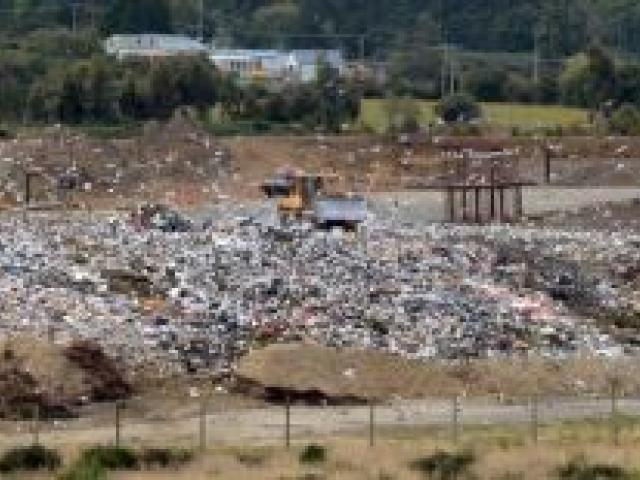
Council staff say landfills have long made a profit for the council, and city councillors decided several years ago to let the landfill continue to make a surplus as a way to increase non-rates revenue and offset general rates.
While rates cover the cost of kerbside recycling, the cost of operating the landfills and the profit made from them is largely generated from user fees.
The fees are set to include the surplus, some of which is set aside for capital expenditure and investment, with the remainder - a budgeted $1.3 million this financial year - returned to the general rates pot.
In 2012-13, the actual solid waste surplus was $667,000, $183,000 shy of the forecast surplus of $850,000.
It appeared the 2013-14 year was also likely to be under budget until councillors agreed to increase the fees and booth operators at the landfill were asked to stop using their discretion for charging, moves that have been greeted with anger by many landfill users.
Council solid waste manager Ian Featherston said while the budgeted surplus from the council's total solid waste activities this year was $1.36 million, the surplus generated by the council's landfills alone was expected to be $1.5 million.
Should the surplus not be available to the council, the general rate would have to be increased, or services reduced, to meet the council's overall budget.
Mr Featherston said councils commonly used waste disposal, particularly landfills, as a way to make a surplus and he has previously told councillors Dunedin's landfill fees are lower than those of other cities.
He said some councils channelled profits into other areas. The Queenstown Lakes District Council, for example, used its landfill profits to pay for its recycling scheme instead of taking rates for that.
The decision about how much surplus was made was entirely up to councillors.
Cr Andrew Noone said he had not been exactly aware how much revenue the solid waste activity made, but it was one of the few areas where councils could make some income, when the alternative of increasing the general rate to raise that amount of funds was ''not very palatable''.
There was also a balancing act between getting people thinking a bit harder about their waste disposal while ensuring fees were not so high people turned to illegal ways of disposing of waste.
Another long-term councillor, John Bezett, said several people had said to him they did not think the methodology for fee-setting was fair.
''And if I wasn't a councillor I'd say I agree with that. I don't think it is fair, but there are other factors in there. My general philosophy with regards to council services is that user pays.
''I don't believe someone should be paying extra so the cost can be offset somewhere else, unless the people who are paying more are getting the benefits of the top-up, so to speak, somewhere else.''
Cr Lee Vandervis said it was an ''underhand way'' of charging some Dunedin residents higher rates. It was not obvious when it was signed off there would be such a surplus pumped back into trying to keep the rates down, he said.
''We should really just charge what the service costs and, if we are charging that much more, I believe that is not appropriate. It is a way of subsidising rates and making the rates look as though they are less, but that's not what we should be about.''
But Cr Kate Wilson said there were many council charges and rates that effectively subsidised other activities, for example, parking enforcement (which is budgeted to return $398,000 to the general rate this year) and library rates, which all ratepayers paid, although not all used the library.
''That is the nature of rates. They are very blunt, as are fees. They're not always fair or easy to work out.''
Dunedin Mayor Dave Cull said the council had been making a surplus from solid waste activities for years, but it recognised it may not have set the fees quite right yet.
''We're trying to achieve fairness and the right incentives [to encourage waste minimisation and recycling as well as proper disposal] and we are not sure that we have got it right, so we'll keep looking at it in an effort to make it better.''
Councillors said charges and fees were likely to be the subject of discussion at this week's annual budget meetings.
The numbers
• Waste into Green Island landfill in 2012-13: 52,000 tonnes
• Cost to dispose of waste per tonne: $130 (2013-14) (green waste disposal costs not calculated separately)
• City landfill operating costs are covered and surplus generated almost entirely by fees and charges, (there are other smaller streams of income, such as compost sales and Recovery Store sales)
• Charges are the same at the Green Island and Waikouaiti landfills and the Middlemarch transfer station
• Actual surplus from DCC's total solid waste activities in 2012-13: $667,000 ($183,000 below budget)
• Total solid waste activities forecast surplus in 2013-14: $1,360,000
• Budgeted cost of operating the city's landfills in 2013-14: $4,971,400
• Budgeted revenue from landfills 2013-14: $6,247,700
• Budgeted return to general rate pot from solid waste activities surplus in 2013-14 (less other costs such as capital expenditure and investment): $1,293,000
